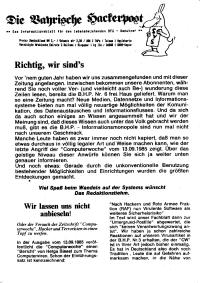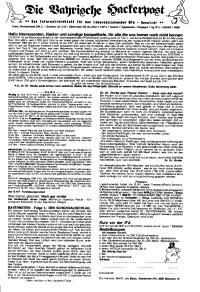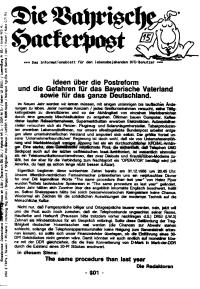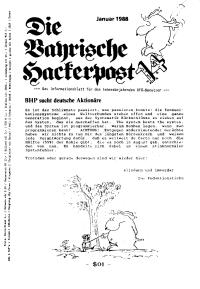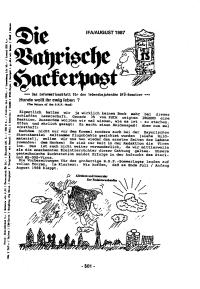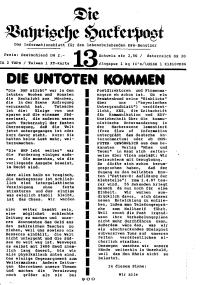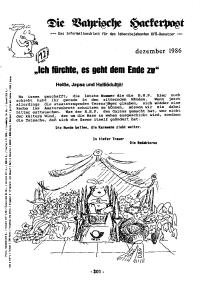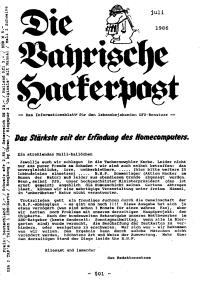Copy Link
Add to Bookmark
Report
OtherRealms Issue 24 Part 08

Electronic OtherRealms #24
Spring, 1989
Part 8 of 10
Copyright 1989 by Chuq Von Rospach
All Rights Reserved
OtherRealms may not be reproduced without permission from Chuq Von Rospach.
Permission is given to electronically distribute this
issue only if all copyrights, author credits and return
addresses remain intact. No article may be reprinted or re-used
without permission of the author.
Lots and Lots of Reviews
by
Lots and Lots of People
Part 1
Alternities
Michael P. Kube-McDowell
Ace Books, 1988, 0-441-01774-6, 383 pp., $3.95.
With the death of Robert A. Heinlein, we lost one of the best pragmatic
and predictive political scientists of this century. With Alternities,
Kube- McDowell amply demonstrates that the torch has been passed.
Alternities is nothing less than a political science tour de force, an
exercise in alternate history and sociology, set against the dramatic
countdown to a different America's first-strike nuclear Armageddon.
In 1966, a Walter Endicott stumbles through a gate between his own
America and what comes to be called the Home Alternity, to find himself
no longer in Philadelphia, but in Boston, and no longer in a world
where the U.S. is winning the Cold War. By 1977, the secret Tower Guard
of the National Resource Center, as administered by Albert Tackett for
President Peter Robinson, robs the other seven Alternities thus far
discovered. Technology, especially weapons systems stolen from worlds
where the U.S. did challenge the communists in Korea and in Viet Nam,
seems the only hope for a besieged Fortress America where Eisenhower
never became President and paranoid McCarthyite isolationists
prevailed. The perverse Endicott, now a powerful U.S. Senator, urges
President Robinson to think the unthinkable, to plan a nuclear first
strike against the Russians. For those in power, for the Alpha List,
Robinson orders Tackett to prepare an escape from nuclear madness, a
wholesale transfer of the leadership and their families through the
gate to the gentler, kinder Indianapolis of Alternity Blue.
For the grunt in the trenches, Rayne Wallace, little of the powerplays
in his Home Alternity is apparent, as he shuttles from one Alternity to
another as a Tower Guard runner. Wallace is more concerned with his
disintegrating marriage to Ruthann in Boston, and his blossoming love
for Shan Scott, once he is transferred to mole status in Alternity
Blue. As Wallace and his fellow Guardsmen use the gates, they also
become aware of a darker force at work, perhaps the very Gatekeeper
itself.
While many have patrolled these paratimes before, Kube- McDowell's
version -- an apparent twist of Klein-Kaluza spacetime -- paves new and
intriguing ground. With a 1950 branching point, and a setting ten years
in our past where tantalizing glimpses of many other geopolitical
settings credibly portray what might have been, the novel is both
cautionary tale and history lesson. Turn off the TV and read this one
now; it's a keeper.
-- Dean R. Lambe
Brothers in Arms
Lois McMaster Bujold
Baen Books, 1989, 0-671-69799-4, 338 pp., $3.95.
Bujold's space romping wimp with mind of steel, Lord Vorkosigan of
Barrayar -- alias Admiral Miles Naismith of the Dendarii Free Mercenary
Fleet -- takes a rest and refit on the sod of Earth. With more buckle
than swash this time, the adventures of Miles and his merry band
continue in a battle with evil Cetagandans, bureaucratic twits,
grogshop wenches, and the odd clone.
Fresh from his triumphant POW camp rescue on Dagoola IV, and scarred
from encounters with Cetagandan ships, Admiral Naismith expects repair
of both ships and crew as he enters Earth orbit. When Miles, as his
alter ego Lt. Vorkosigan, checks in with his secret masters in Barrayar
Intelligence at the embassy in old London, however, he finds that
by-the-book Captain Galeni has neither new orders nor much needed
payment for the Dendarii mercenaries. Forced into busywork with his
indolent cousin Ivan Vorpatril, Miles chafes under Galeni's command.
Continuing delays in orders and payment push the mercenary fleet near
bankruptcy, and Miles begins to suspect the motives of Galeni, a son of
Komarr, the planet whose rebellion was crushed by Miles' powerful father.
When a few of his troops get drunk and disorderly, Miles' dualistic
identity is threatened by a nosy vid reporter, and he invents a not
very convincing clone. Just as he finally overcomes his shyness with
the comely Commander Elli Quinn, a real clone appears, and even Quinn
and cousin Ivan are fooled by this new Mark, the pseudo Miles. The
whole future of Barrayar, not to mention the Dendarii Free Mercenaries,
is threatened by old foes and new woes.
With this sins of the fathers, wins of the sons sequel, Bujold scores
more goals for her series characters. If Earthbound fear of financial
ruin while threatened by advancing tides seems strange venue for space
opera, it is the '80s thing to do, and solid entertainment lurks within.
-- Dean R. Lambe
The Dark Door
Kate Wilhelm
St. Martin's Press, 1988, 0-312-02182-8, 248 pp., $16.95.
Back in stride as master of the psychological suspense division of SF,
Wilhelm's latest offers an entertaining variant on "The Thin Man"
theme. Unlikely husband and wife detectives, Charlie Meiklejohn and
Constance Leidl -- he a former New York cop and arson investigator, she
a psychologist -- take on the case of the blazing inns, and risk more
than first-degree burns.
The story opens as Carson Danvers, his wife and son inspect the old
River House inn outside of Washington D.C. Danvers intends to reopen
the old place as an upscale restaurant, but encounters horror instead
as an alien interstellar probe malfunctions. Wounded and disfigured,
Danvers is mistaken for insurance adjuster John Loesser, and as Loesser
he embarks on a cross-country hunt for the alien entity, a dark
presence which causes only some to go violently insane. Danvers
discovers that fire will remove his version of the devil from its
preferred locus in high doorways of old buildings without electricity.
After a six-year multi-state swath of fire, Danvers' crusade comes to
the attention of Charlie and Constance, when underwriters seek
Charlie's expertise. After the terror and death strike a Northern
California boarding school, Constance brings Byron Weston, a crisis
intervention psychotherapist, into the investigation. Gradually, the
informal team comes to realize that Danvers may not be the public
menace and crazy firebug he appears to be, and when Charlie's mind is
affected by the entity at a ghost town in Nevada, Constance has to take
drastic action.
While the reader may suspect that Wilhelm's agent is pushing this hard
in Hollywood, for it would make a fine edge-of-the-chair movie,
plotting and characterization far surpass the usual Tinseltown cliches,
and it merits your attention in the original vernacular.
-- Dean R. Lambe
The Dark Lady [****-]
Mike Resnick
This is the first book I've read by Mike Resnick, but it won't be the
last. The basic plot involves a search for a woman who appears as the
subject of several artworks. Since the paintings span about 8000 years
of human history, this is obviously not your average model. There are
also some mythic overtones surrounding the search that are well
handled. In short, I picked the book up for what looked like a decent
concept, and was hooked. There were also some side currents that seemed
to tie in with other books by Resnick set in the same universe. This is
one time I don't mind having a bunch of books set in the same universe;
it looks interesting and well thought out. The only thing I really
disagreed with were the stock aliens who acted too human. But that's a
relatively minor blemish on a otherwise very good story.
-- Chuck Koebel
Dragonsdawn [***]
Anne McCaffrey
The latest Pern book tells the story of the original human landing on
the planet. This has everything you expect from a Dragonrider book:
threadfall, dragons, fire lizards, spunky young heroine and hero, etc.
The society from the earlier (later, chronologically) books hasn't
developed yet, but McCaffrey does plant the seeds for it. Not much real
suspense, though, since we do know how Pern eventually turns out. Avid
fans will probably rate the book [****]; readers looking for deep
meaning or hard science might rate it [**]. For the rest of us, it's
just a good, entertaining read.
-- Chuck Koebel
Dreams Of Dawn
Marti Steussy
Del Rey 1988 313 pp $3.95 345-35233-5
On the planet Karg, the human colony had been permitted to remain by
the crustacean-like native sentients, against the recommendation of
Circle Dawn, a multi-species, socio-ecological investigative team. Now,
however, the Kargans have appealed for help from the Circle. The young
of the Kargans are dying at an appalling rate, and they blame it on the
humans. Can the Circle team find a solution to this biochemical mystery
that will satisfy both Kargans and humans?
This is pretty much your standard issue Del Rey novel, a reasonably
well crafted, carefully middle-of-the-road adventure tale with minimal
literary or thematic ambitions. For my taste there's rather too much
expository backfill slowing down the plot, especially in the first
half; and the author's habit of changing viewpoint characters every few
pages soon becomes annoying. However, both the pace and the story
improved in the second half of the book. A fair read for those who do
not approach this book with too high expectations.
-- David M. Shea
My Father Immortal
Michael D. Weaver
St. Martin's Press, 1989, 0-312-02617-X, 228 pp., $16.95.
Cry the beloved genre! I tried with Mercedes Nights, Weaver's first SF
effort, but gave it up as unreadable. This time, I gnashed teeth past
the Prologue (the middle of the story) and all the way to the end, only
because the confused, disjointed, semiliterate muddle was a marvel of
ideas last fresh when written by Jules and Herbert George.
Product of the second TV generation -- with science and English grammar
to match -- this rehash of When the Sleeper Wakes pits the cryogenic,
matriarchal Grant family against a rock band (pun alert!) of
gengineered human mutant troglodytes some 4000 years after the red
balloons went up. Mother Grant, megacorporate nastiness incarnate,
froze the family and a small army as a savings deposit for a later
brave new world. Unfortunately, Stigg, that fun-loving cave guy, was
out playing with still-functional, 4000-year-old hand grenades one day,
and his game of boom-ball unearthed Tiffany from her cold sleep
chamber. Tiffany's brother Philip, in cooperation with the dumbest
Artificial Intelligence a computer programmer (Weaver's day job) ever
created, wakes the whole family, and a small war ensues.
The mutants, when they're not playing 4000-year-old rock music or
discussing equally elderly video programs, shrug off bullets, antitank
rockets, and nuclear weapons with Godzilla-like ease. Happily, these
indestructible immortals, inhabitants of a razed planet that couldn't
possibly have a breathable atmosphere, remain fertile with mere Grant
girls. Tiffany and her cousins get knocked up, just in time for the
great starship finale.
But wait, that's not how the story goes. The story, in a "multiple POV
within a letter within a letter to siblings" framework pioneered by
Mary W. Shelley, is told by Tiffany's kid, Daniel, as the child's
escape pod drifts back to Earth. Daniel writes Mom's tale on toilet
paper tubes that he exchanges somehow with the pods of three other kids
who survive the belt with asteroids. Did I mention hair and fingernails
that continue to grow throughout those millennia of cryogenic
suspension? Well, let's throw that in here -- a model of Weaver's
smooth transitions.
Control seems the major theme, yet Weaver and his editor clearly have
none. Those of us who know that "Rubicon" is a proper noun are made
cross by the random sprinkling of names like Cocteau, Coleridge,
Aristotle, and Satre, while the really heavy references are to
contemporary movies. Avoid this derivative pretension.
-- Dean R. Lambe
------ End ------











